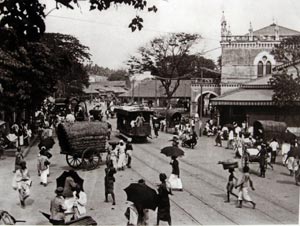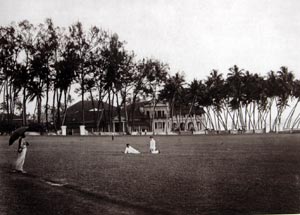Born in New York in 1862, Walter Del Mar managed to excel in a financial career and become a notable author - in his case specialising in oriental travel. During the early 1890s he was a financial correspondent in London and later established a firm that represented important American financial interests. In 1914 he returned to New York where he remained until his death in 1944. Del Mar’s books include India of To-Day (1905), The Romantic East: Burma, Assam and Kashmir (1906), and Around the World through Japan (1903) in which there is a little-known account of his stay in Ceylon.
 |
A review of Around the World in the New York Times of February 7, 1903, notes: “In globe-trotting there are disappointments as well as enjoyments, and in his journey round the world Walter Del Mar gives us his varied experiences.” The frustrating disappointments of a western traveller in the Orient – or, in the case of the Pearl of the Orient, zemblanity, the converse of serendipity, “which always hovers, ready to catch even the ultra-wary in its grasp” (to quote myself) – is written with humour and irony, although sometimes prejudice intrudes. But the most important aspect is not so much the anecdotes and generally engaging prose but the obscure travel information of the period that Del Mar imparts. Indeed, there is so much of worth that I shall restrict myself to his Colombo experiences and an excursion to Galle.
After arriving at Colombo, Del Mar reports the usual harbour activity of the period, the “queer craft with an assortment of humanity emitting a Babel of sounds”, “naked boys waiting to dive for coins”, and other boys “in a tiny boat who were moving about at a good pace by using their loin-clothes as sails”. And then there were “outrigger canoes, very narrow but very safe, which compete with the steam launches and whale-boats for the honour of carrying you and your belongings ashore”.
It’s surprising to learn that there was “no examination of passengers’ luggage at the custom-house”. However, “every nailed-up box, however small, had to be opened, and firearms had to pay duty.”
Those who relish the minutiae of travel a century ago will be interested to learn there was a system whereby passengers who had “paid ten shillings in London for the luxury knew that our safe arrival would be announced to our friends in England the same morning if we took care to hand in our cable ticket to Reuter’s agent on landing”.
Although the Peninsular and Oriental Steam Navigation Company (P&O) acquired a favourable reputation in the 20th century, it is remarkable how many complaints there are in travel accounts of a slightly earlier time. As Del Mar remarks: “We fully appreciated the feeling of relief so many travellers profess upon leaving a P&O steamship. The main cause of complaint was the food, which by the time we got into the Arabian Sea was almost uneatable. Among minor comforts, even ship letter-paper was conspicuous by its absence.”
For many modern northern tourists keen to expose their milky skin (well-anointed with sunscreen of course) to solar rays immediately upon arrival, it’s a giggle to learn that Del Mar made a vital purchase even before proceeding to the Galle Face Hotel: “Protected by straw hats and sun-umbrellas, we first went and bought solar topees, and felt safe from the sun under our pith or cork headgear. We had been warned of the danger of exposing ourselves to the sun, and were not surprised to hear later in the day that one man who had tempted Providence in a cloth cap had fallen victim to a severe sunstroke.”
 |
When crossing Colombo’s main streets a century ago weighed down by their solar topees, visitors didn’t have to avoid careening, weaving lorries, buses, trishaws and other traffic. Yet, remarkably, in virtually empty streets, they found rail-bound and therefore directionally predictable trolleys a threat: “After a narrow escape from being run down by one of the cars of the electric trolley lines that have their joint terminus outside the Grand Oriental Hotel, we took rickshaws to the Galle Face Hotel, to see if our luggage had safely arrived.”
Zemblanity struck at the Galle Face, for “when we approached the gateway to the hotel grounds, our coolies stopped short and said they were not allowed to go any farther, so we asked them the fare and paid our two shillings each. When we got to the door we found how neatly we had been tricked; for there was no reason for stopping at the gate except to prevent us from seeing the conspicuous table of fares posted at the door, which showed we had paid six times the proper amount.”
Del Mar and party were active soon after their arrival, and describe the Galle Road in terms that are incomprehensible today. “We first drove to Mount Lavinia, by way of the Kollupitiya (or Colpetty) road - a drive full of interest and entertainment, for it is an epitome of most that is pleasant in the life of the island.”
The different areas of the capital are colourfully described. For example, the Fort, “with its bright, clean buildings and broad, hot roads, is mostly occupied by business houses and government office,” and “where the punkah-wallahs on the verandas were sluggishly pulling their ropes with their feet”. Also Pettah, “where, in dust and bad odours, the poorer natives mostly congregate, and where trade and commerce can be seen in their ugliest forms,” a “Thieves’ Market into which goods and chattels mysteriously lost or stolen usually find their way”.
In those days the rooms at the Galle Face Hotel had a peculiar stable-like structure. “We smoked our cigars on the covered verandah, while watching a heavy rain and vivid lightning storm,” Del Mar recounts, “and then to bed, in rooms separated by thin walls reaching only halfway to the leaky ceiling, a capital arrangement for coolness and airiness; but as every movement in the neighbouring rooms is painfully distinct, a poor lookout for anyone troubled with insomnia.
However, it was a vast improvement on a ship’s cabin, and a great comfort, after having been interviewed in the bathroom by cockroaches fully two inches long, to lie under the mosquito netting on a big soft bed instead of a narrow shelf of a berth to which we had become accustomed.”
According to Del Mar, the German manager of the Galle Face – incidentally there was also a German manager at the Grand Hotel, Nuwara Eliya – “disclaimed any responsibility for the luggage, wash, mail, or telegrams of his guests, or for any of the acts or omissions of his servants”. Obviously the architecture and the manager’s attitude soon changed so that the Galle Face could be dubbed not just “the oldest hotel east of Suez” (it opened in 1864 before Singapore’s Raffles) but also “the finest hotel east of Suez”.
Del Mar and his companions made a day trip by train to Galle that had a spectacular equine-oriented beginning. “After breakfast, we took the first train by the Sea-coast Line. It takes about four hours to do the 74 miles. The railway, which is so full of curves that it is said to ‘dodge the coconut groves’, follows the winding but excellent highroad southwestwardly along the coast. The locomotive carries a cow-catcher, and at the Slave Island station a horse, attached to a carriage containing four people, fell on the line and was bodily lifted to one side by the cow-catcher, escaping with a few bruises while people in the carriage were unhurt.”
Remarkably, unlike most overseas visitors to the Galle Literary Festival, and the self-styled “fabulous nobodies” – those of the Occidental enclave – Del Mar and party found Galle not a delirious delight but a downright disappointment. “We made the circuits of the old fort, and walked through the sleepy town after a luncheon at the rest-house. But we hardly felt repaid for the eight hours spent in the crawling train and we were glad when night came and we arrived back at Colombo.” |



